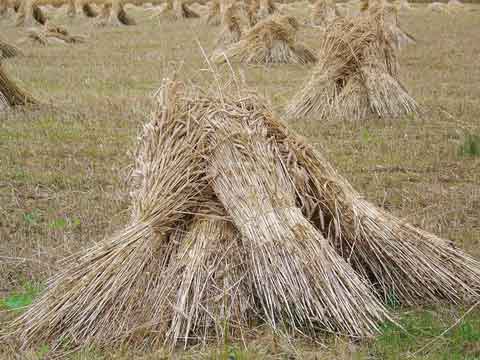Aṇguttara-Nikāya
III. Tika Nipāta
X. Loṇa-Phala Vagga
The Book of the Gradual Sayings
or
More-Numbered Suttas
III. The Book of the Threes
X. A Grain of Salt
Sutta 92
Paviveka Suttaṃ
Aloofness
Translated from the Pali by
F.L. Woodward, M.A.
Copyright The Pali Text Society
Commercial Rights Reserved
![]()
For details see Terms of Use.
Once the Exalted One was dwelling near Sāvatthī.
There the Exalted One addressed the monks, saying:
"Monks."
"Yes, lord," they replied, and the Exalted One said:
"Monks, the Wanderers holding other views
enjoin these three forms of aloofness.
What three?
Aloofness from robes,[1]
from alms-food,
from lodging.
■
Now in the matter of aloofness from robes
the Wanderers holding other views
enjoin the wearing of coarse, hempen clothes,
clothes of different[2] fibres,
discarded corpse-cloths,
rags from a rubbish-heap,
tree-bark fibre,[3]
antelope skins,
strips of antelope skins,[4]
clothes made of kusa-grass,
made of wood-shavings.
They wear blankets made of human hair,
made of horse hair,
made of owls' wings.
That is the practice they enjoin
as regards robes.
■
Then in the matter of aloofness
as regards alms-food:
They feed on vegetables,
millet,
raw rice,
wild rice,[5]
water-plants,[6]
rice-powder,
burnt scum of rice,[7]
flour of oil-seeds,
on grass
and cowdung.
They keep themselves alive
by eating forest roots and fruit,
and fruit that has fallen.
Such is their practice
as regards aloofness from alms-food.
■
Then again, monks,
the Wanderers holding other views
enjoin in respect of aloofness from lodging:
Dwelling in a forest
at the root of a tree,
in a cemetery,
in a lonely jungle-glade,[8]
in the open air,
on a heap of straw,
in a thatched [221] shelter.
Such ways of dwelling do they enjoin.
These are the three injunctions
of the Wanderers holding other views.
§
2. Now, monks, there are these three forms of aloofness
for a monk under this Dhamma-Discipline.
What three?
Herein a monk is moral,
he has abandoned immorality,
from that he is aloof.
He has right view,
he has abandoned wrong view,
from that he is aloof.
He has destroyed the āsavas,
the āsavas are abandoned by him,
from them he is aloof.
■
Now in these three sorts of aloofness
this monk is called:
'One who has reached perfection,'
'one who has reached the essential,'
'one who is set firm in the essential.'[9]
■
3. Suppose, monks, a yeoman farmer's
field of paddy
is in good order.
Stook: To pile up sheaves on end against one another to protect the grains from moisture rising up from the ground and to start the drying-out process. [> stack]

Image from Wikipedia
![]() — p.p.
— p.p.
That yeoman farmer
reaps it quickly,
and having done so gathers the crop quickly,
gets it harvested quickly,
puts it in stooks,
treads it out,
pulls off the stalks,[10]
winnows away the chaff,
collects the rice,
thrashes it out
and removes the husks quickly.
Thus that yeoman farmer's crops
reach perfection,
come to the essential,
are cleansed
and set firm in the essential.
■
[4][than] Just so, monks,
in the autumn season
when the sky is clear
and the clouds have fled,
the sun
leaping up[11] into the firmament
drives away all darkness from the heavens
and shines and burns and flashes forth, -
even so in the Ariyan disciple
arises the flawless,
taintless eye of wisdom,[12]
and along with this arising
three fetters are abandoned,
to wit:
The view of the person-pack,[13]
doubt-and-wavering
and wrong handling of rite and ritual.
■
Nay more,
he departs from two things,
coveting
and malevolence.
■
This disciple,
aloof from sensual desires,
aloof from unprofitable states,
entering on the first musing,
which is accompanied by thought directed and sustained,
born of seclusion,
zestful and easeful,
dwells therein.
[222] At such time, monks,
if the Ariyan disciple should make an end,
there is no fetter
bound by which
he would come back again
to this world."[14]
[1] Cīvaraṃ (etc.) nissāya uppajjanaka-kilesehi vivitta-bhāvaṃ. Comy.
[2] Masāṇa, 'of mixed texture.' Comy. The Buddha himself had tried all these ascetic practices, acc. to M. i, 77 ff.
[3] Tirītakāni, at D. i, 166 tirītīni.
[4] Comy. says it also means 'with horns and hoofs still attached.'
[5] Daddula. Comy. (as at MA. ii, 45) calls this 'the parings of hide thrown away by leather-workers,' but this would hardly be vegetarian diet! Cf. infra, text 295 re 'the Unclothed.'
[6] Haṭa = sileso or sevāḷa. Comy.
[7] Ācāma, 'the burnt overboilings of pots.' Comy.
[8] Vanapanthaṃ. Comy. does not discuss these terms. At MA. ii, 215 (on M. i, 181), text and Comy. alike read vanapatthaṃ (cf. Vibh. 251), 'wilderness.'
[9] Sāre patiṭṭhito = sīla-samādhi-paññā-sāre p. Comy. Cf. M. i, 31.
[10] Uddharāpetvā.
[11] Cf. D. ii, 183; M. i, 317 = S. iii, 156 = Itiv. 20. Abbhussakamāno is also read.
[12] Dhamma-ccakkhu, cf. D. i, 86, 'the insight of the stream-winner into the Four Truths.' Comy.
[13] Sakkāya-.
[14] He would then be not stream-winner but non-returner. Comy. says he is jhān'anāgamin.